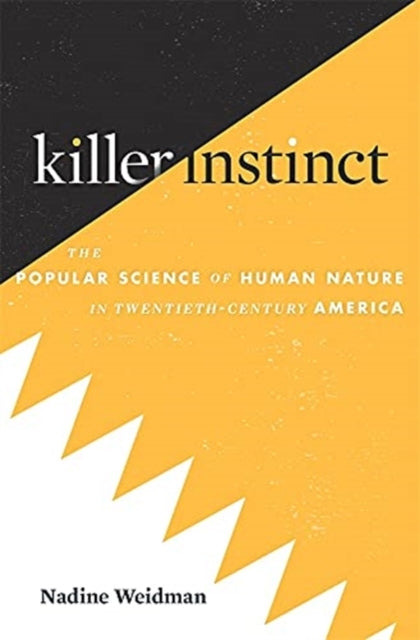Nadine Weidman
Killer Instinct: The Popular Science of Human Nature in Twentieth-Century America
Killer Instinct: The Popular Science of Human Nature in Twentieth-Century America
YOU SAVE £8.30
- Condition: Brand new
- UK Delivery times: Usually arrives within 2 - 3 working days
- UK Shipping: Fee starts at £2.39. Subject to product weight & dimension
Bulk ordering. Want 15 or more copies? Get a personalised quote and bigger discounts. Learn more about bulk orders.
Couldn't load pickup availability
- More about Killer Instinct: The Popular Science of Human Nature in Twentieth-Century America
The book "Killer Instinct" explores the debate between nature and nurture in the popular sciences of animal and human behavior, tracing how Konrad Lorenz, Robert Ardrey, and their followers argued that the aggression instinct drove human evolutionary progress. Critics presented a rival vision of human nature, but the debate became polarized and ultimately absorbed back into the nature-versus-nurture formulation.
\n Format: Hardback
\n Length: 368 pages
\n Publication date: 26 November 2021
\n Publisher: Harvard University Press
\n
Are humans innately aggressive or innately cooperative? In the 1960s, bestselling books enthralled American readers with the startling claim that humans possessed an instinct for violence inherited from primate ancestors. Critics responded that humans were inherently loving and altruistic. The resulting debate—fiercely contested and highly public—left a lasting impression on the popular science discourse surrounding what it means to be human.
Killer Instinct traces how Konrad Lorenz, Robert Ardrey, and their followers drew on the sciences of animal behavior and paleoanthropology to argue that the aggression instinct drove human evolutionary progress. Their message, spread throughout popular media, brought pointed ripostes. Led by the anthropologist Ashley Montagu, opponents presented a rival vision of human nature, equally based in biological evidence, that humans possessed inborn drives toward love and cooperation. Over the course of the debate, however, each side accused the other of holding an extremist position: that behavior was either determined entirely by genes or shaped solely by environment. Nadine Weidman shows that what started as a dispute over the innate tendencies of animals and humans transformed into an opposition between nature and nurture.
This polarized formulation proved powerful. When E. O. Wilson introduced his sociobiology in 1975, he tried to rise above the oppositional terms of the aggression debate. But the controversy over Wilson's work—led by critics like the feminist biologist Ruth Hubbard—was ultimately absorbed.
In the 1960s, bestselling books enthralled American readers with the startling claim that humans possessed an instinct for violence inherited from primate ancestors. Critics responded that humans were inherently loving and altruistic. The resulting debate—fiercely contested and highly public—left a lasting impression on the popular science discourse surrounding what it means to be human.
Killer Instinct traces how Konrad Lorenz, Robert Ardrey, and their followers drew on the sciences of animal behavior and paleoanthropology to argue that the aggression instinct drove human evolutionary progress. Their message, spread throughout popular media, brought pointed ripostes. Led by the anthropologist Ashley Montagu, opponents presented a rival vision of human nature, equally based in biological evidence, that humans possessed inborn drives toward love and cooperation. Over the course of the debate, however, each side accused the other of holding an extremist position: that behavior was either determined entirely by genes or shaped solely by environment. Nadine Weidman shows that what started as a dispute over the innate tendencies of animals and humans transformed into an opposition between nature and nurture.
This polarized formulation proved powerful. When E. O. Wilson introduced his sociobiology in 1975, he tried to rise above the oppositional terms of the aggression debate. But the controversy over Wilson's work—led by critics like the feminist biologist Ruth Hubbard—was ultimately absorbed.
In the 1960s, bestselling books enthralled American readers with the startling claim that humans possessed an instinct for violence inherited from primate ancestors. Critics responded that humans were inherently loving and altruistic. The resulting debate—fiercely contested and highly public—left a lasting impression on the popular science discourse surrounding what it means to be human.
Killer Instinct traces how Konrad Lorenz, Robert Ardrey, and their followers drew on the sciences of animal behavior and paleoanthropology to argue that the aggression instinct drove human evolutionary progress. Their message, spread throughout popular media, brought pointed ripostes. Led by the anthropologist Ashley Montagu, opponents presented a rival vision of human nature, equally based in biological evidence, that humans possessed inborn drives toward love and cooperation. Over the course of the debate, however, each side accused the other of holding an extremist position: that behavior was either determined entirely by genes or shaped solely by environment. Nadine Weidman shows that what started as a dispute over the innate tendencies of animals and humans transformed into an opposition between nature and nurture.
This polarized formulation proved powerful. When E. O. Wilson introduced his sociobiology in 1975, he tried to rise above the oppositional terms of the aggression debate. But the controversy over Wilson's work—led by critics like the feminist biologist Ruth Hubbard—was ultimately absorbed.
\n Weight: 744g\n
Dimension: 171 x 242 x 41 (mm)\n
ISBN-13: 9780674983472\n \n
This item can be found in:
UK and International shipping information
UK and International shipping information
UK Delivery and returns information:
- Delivery within 2 - 3 days when ordering in the UK.
- Shipping fee for UK customers from £2.39. Fully tracked shipping service available.
- Returns policy: Return within 30 days of receipt for full refund.
International deliveries:
Shulph Ink now ships to Australia, Belgium, Canada, France, Germany, Ireland, Italy, India, Luxembourg Saudi Arabia, Singapore, Spain, Netherlands, New Zealand, United Arab Emirates, United States of America.
- Delivery times: within 5 - 10 days for international orders.
- Shipping fee: charges vary for overseas orders. Only tracked services are available for most international orders. Some countries have untracked shipping options.
- Customs charges: If ordering to addresses outside the United Kingdom, you may or may not incur additional customs and duties fees during local delivery.


